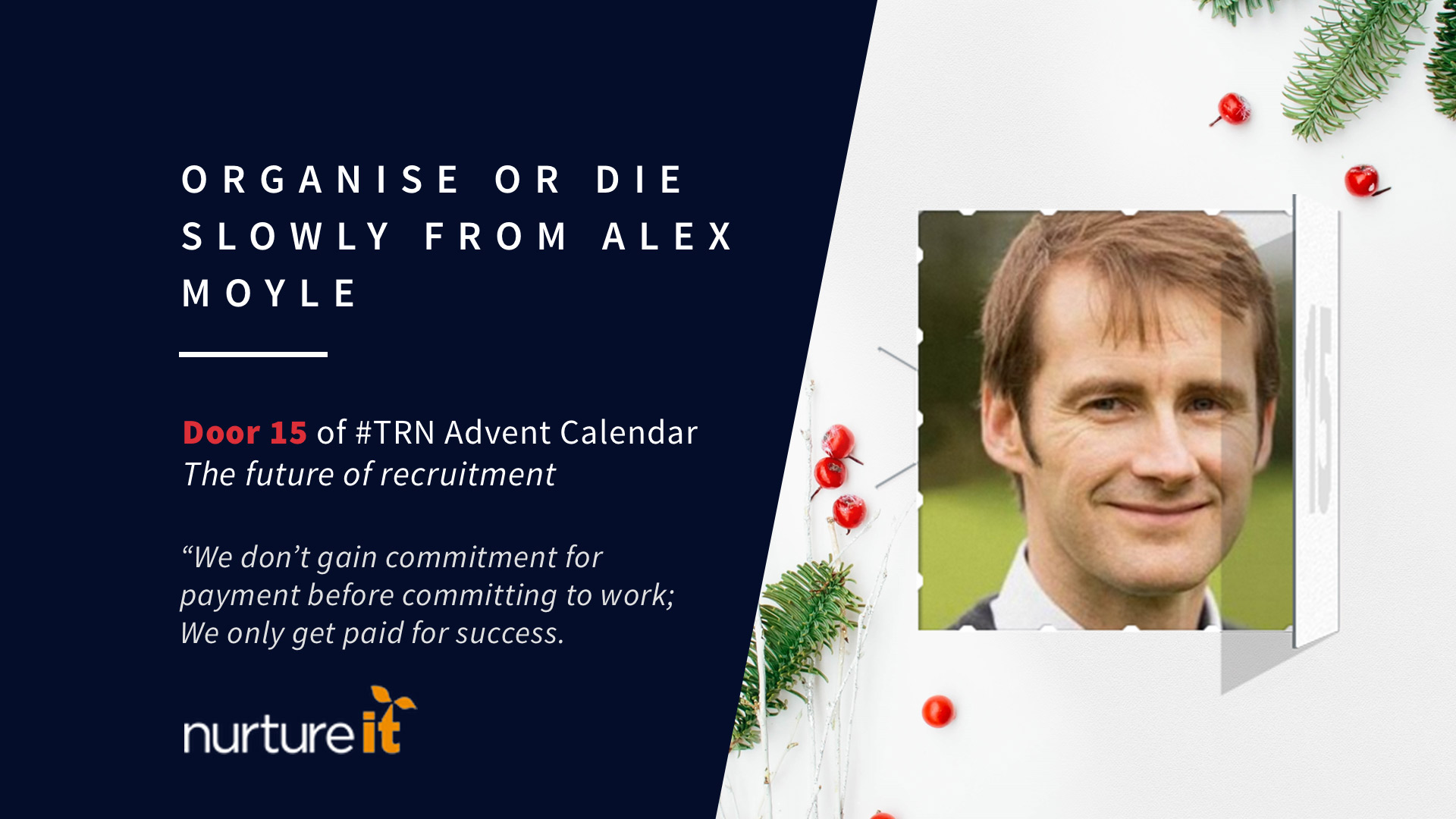Door 15 of our #TRN Advent Calendar. Co-Founder of Nurtureit.io, speaker and trainer Alex Moyle explains why the future of recruitment means organise or dieYou need to get organised or you will see your businesses die. Slowly.
Unlike lawyers, accountants or marketers who gain commitment for payment before committing to work; We only get paid for success.
It is not the no-win no-fee aspect of the industry that is the problem. It is the fact that more and more agencies are working on roles where they have little or no commitment from a client. Searching for days on end, posting endless CV’s on portals, only to receive little or no feedback from clients is a fool’s game. Thousands of recruiters do this every day. To make matters worse many are doing this for low-level fees.
The end result is that thousands of agencies are unable to reach a level of productivity that rewards both consultants and business owners for their efforts. If you are wondering whether this is you, then there are some signs you need to look for.
– Are you struggling to get average per month billings above £7,000?
– Do you find it difficult to get new 360 recruiters to bill over 10k month in month out?
– Are Over 50% of your roles multi-agency and/or through intermediaries such as internal recruiters?
These are just a few signs of many signs that I see in agencies. The problem is that recruiters spend too much time working for clients that do not value their work. The client isn’t seeking a partnership of equals. The end result is that every month too much hangs on the success of too few deals.
I have more bad news: Things are not going to get any easier.Companies are going to continue to invest in their internal recruiting capabilities. They will become more robust in creating and enforcing PSL’s. Lastly, the sad reality is that there is almost an unlimited supply of recruiters who are willing to work hard with little client commitment and low fees.
It is not all doom and gloom. There are recruiters making a success of the current market conditions.
How are they doing this?
They are relentlessly organised and methodical in their approach. They have an unwavering focus on organising in three areas:
#1: Organise Who You Want To Do Business With
The best agencies are organising clients into three groups,
Bucket 1: These clients value our service. They want to work in partnership with us. Most importantly – they deliver a financial return on time invested.
Action Taken: More proactive effort is made to add more value to these clients, actively cross sell and where possible lock these clients into a contractual arrangement to supply staff.
Bucket 2: These clients do not value the service they receive. Effort invested does not match fees that are received.
Action Taken: These clients are either fired or managers reduce the time and effort experienced recruiters can spend working roles on these vacancies. (Some give these ‘B’ grade clients to the rookie training academy to practice on)
Bucket 3: Potential clients which are known to value agency partnerships (evidenced by fee levels, line manager contact etc).
Action Taken: These are organised into target lists. Directors lead target account teams that bring a range of consultants together to win new business with these clients.
#2: Organise by Area of Specialism
“Are you a wandering generality or a meaningful specific”.
– Zig Ziglar
Productivity is significantly increased when recruiters have an active talent pool ready to be leveraged whenever a new vacancy arises.
Agencies whose focus is too broad geographically or technically, end up generating too many candidates that can never be used in other roles they recruit for.
Great agencies focus on recruiting for roles where the candidates they generate today will be good for the vacancies they source tomorrow.
Specialisation brings two major advantages:
- Specialised agencies can work faster than their competitors.
- Specialised, agencies are more likely to have a talent pool that internal recruiters can’t access through job boards or CV databases.
Agencies manage specialisation by applying a geographic or industry focus to existing technical specialities. The goal is for them to own a talent pool that recruiters cannot access.
The broader the technical speciality – the tighter the necessary geographic or industry focus.
For example, accounting recruitment is a broad technical speciality, so it needs a tight industry or geographic focus to let you build a talent pool that internal recruiters or competitors cannot access.
Conversely Cybersecurity is a niche technical area with a shortage of candidates, so a wide geographical focus is appropriate. However – as the availability of talent increases in the coming years, recruiters will need to be more focused on specific industries or geographies.
#3: Organise your Pipeline
Most recruiters think as far ahead as what they are going to close this month. This leads to inconsistent billings and high levels of emotional turmoil for directors and business owners.
To bill consistently and efficiently, you need to take a holistic view. Placements, Vacancies and Leads.
Placements: Ensure that every offer accepted is nurtured through to start, and that every candidate that starts is nurtured through their probationary period.
This typically means companies create checklists of activities to be performed at each stage. Then recruiters are held accountable for executing the checklist. It is not glamorous, but it effective in ensuring that ever offer turns into a fee that sticks.
Vacancies: Managers are becoming more focused in prioritising which vacancies receive the most consultant effort. The key is that companies have a common way of grading the quality of a vacancy. It doesn’t matter if you use A,B,C or 1,2,3. It does matter that effort is prioritised
Leads: Companies typically give recruiters too much independence to manage their leads. The result is that top billers often ignore hot leads that others could chase, or new recruiters do too little to convert leads that could help them reach productivity.
When leads are hidden in calendar callbacks or personal spreadsheets managers can’t help, and can’t gain visibility on the future vacancy pipeline.
The challenge here is that CRM’s make it hard to enter data, and harder to get an overview of placements, vacancies and leads. Shared spreadsheets are a common workaround, but these are cumbersome to manage. This is why I have created Nurtureit.io to help both recruiters and managers organise and manage their sales pipeline.
I hope you have enjoyed this festive blog. Over the last few years, I have seen too many good firms struggle to achieve their growth goals because they are not organised enough.
I can’t offer a magic bullet. It takes work and focus to improve your agencies’ approach.
I can help you in organising your pipeline. We built Nurtureit.io for exactly this job. Check it out, and start the new year on the right track!
Share :




